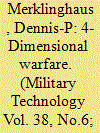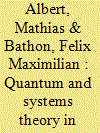| Srl | Item |
| 1 |
ID:
131964


|
|
|
| 2 |
ID:
030458


|
|
|
|
|
| Publication |
Baltimore, The Jones Hopkings Press, 1966.
|
| Description |
xvii, 663p
|
|
|
|
|
|
|
|
|
|
|
|
Copies: C:1/I:0,R:0,Q:0
Circulation
| Accession# | Call# | Current Location | Status | Policy | Location |
| 005956 | 327.172/WAI 005956 | Main | On Shelf | General | |
|
|
|
|
| 3 |
ID:
175129


|
|
|
|
|
| Summary/Abstract |
This article provides a sympathetic, yet also somewhat critical, engagement with the notion of ‘quantizing’ by exploring substantive overlaps between quantum and systems theory. It is based on the observation that while quantum theory is ‘non-classical’ in its entire world-view, there is a danger that when it comes to the social world it is simply laid on a world-view of that world, which remains at its core ‘classical’. This situation calls for engaging quantum with existing non-classical social theories. Resemblances between quantum and systems theory are obviously given through similarities around the concepts of observation and meaning, whose status and function in both bodies of theory is explored. We then probe the degree to which obvious analogies in fact could be read as overlaps and similarities that could be put to complementary analytical use: in a sense, we argue that systems theory ‘does’ quantum theory, and vice versa. The article concludes with some vistas of this discussion for the field of international relations.
|
|
|
|
|
|
|
|
|
|
|
|
|
|
|
|
| 4 |
ID:
170761


|
|
|
|
|
| Summary/Abstract |
By drawing on critical security studies in the context of a sociotechnical transition, this article calls for more attention to the presence and sometimes alternative use of mostly unobserved security practices in the materialization of everyday consumer goods and services. This call is illustrated through a discussion of the phenomenon of range anxiety and the intra-action between drivers of electric vehicles (EVs), designers, and algorithms that observe, estimate and nudge the remaining range of an EV. Inspired by Foucault and Barad, the range-anxiety discussion offers four alternative security insights. First, it supports an argument to include stress as an embodied instance of insecurity. Second, it draws attention to a security apparatus that is based on a constantly expanding assemblage around range estimates. Third, it shows how this apparatus rests on a novel algorithm that has a continuous instead of a binary output and is governed by a distributed sovereignty: where the driver simultaneously is the object of measurement, subject of governance for more efficient driving and the ultimate sovereign who decides on the trip. Lastly, the discussion highlights how range estimates not only mediate the materialization of EVs and their automobility but also (re)perform epistemological or ontological forms of uncertainty.
|
|
|
|
|
|
|
|
|
|
|
|
|
|
|
|